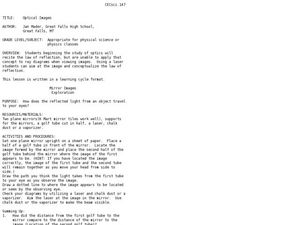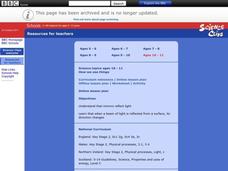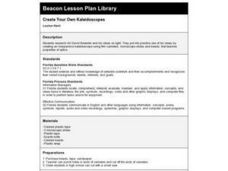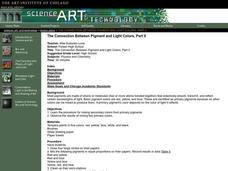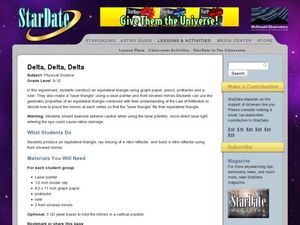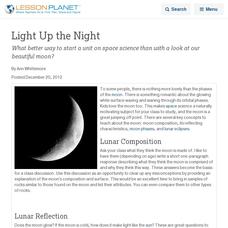Curated OER
Optical Images
Ninth graders study optics and the law of reflection. In this optical images lesson students use a laser and conceptualize the law of reflection.
Curated OER
How We See Things
Students explain that mirrors reflect light. They examine how when a beam of light is reflected from a surface, its direction changes.
Curated OER
Applied Science - Technology (5A) Lab
Fifth graders explore electromagnetic waves and light. In this light lesson, 5th graders draw the parts of a wave of the electromagnetic spectrum. They compare a flashlight to a laser to see how the light looks when shined through...
Curated OER
Online Exploration: Telescopes From the Ground Up
Students explore a web-based illustrated text and interactive graphics to determine the relationship between the operation of telescopes and light. optics. They work in small groups to become an expert on one of the ten eras of telescope...
Curated OER
Create Your Own Kaleidoscopes
Seventh graders create a kaleidoscopes after researching Sir David Brewster and his ideas on light. They recognize the properties of optics from making and using the kaleidoscopes.
Curated OER
Starring...Bears!
Students illustrate a First Nations' legend. In this legend of bears lesson, students read several legends which involve bears and groups of stars or constellations. After reading, students illustrate portions of the stories. Also,...
Curated OER
The Connection Between Pigment and Light Colors
High schoolers learn the procedure for mixing secondary colors from primary pigments and observe the results of mixing two primary colors.
Curated OER
Radiation from Space
In this radiation activity, students review the different types of radiation waves that come from space and the different telescopes used to detect this radiation. This activity has 17 true or false questions.
Curated OER
Microscopes, Telescopes, and Cameras
In this lenses worksheet, students will explain how microscopes work by completing 4 short answer questions. Students will compare refracting telescopes with reflecting telescopes by writing the terms given under the correct column. Then...
Curated OER
Gel-O-Colors!!
What distinguishes the differences between refraction and reflection? Learners identify the properties of light as they mix colored light to create new color variations. As they work they gather data about the properties of light and...
Curated OER
Invisible Rays
Students explore physical science by completing a lab assignment. In this sunlight lesson, students define a list of scientific vocabulary terms and complete fill in the blank questions. Students conduct a photographic experiment in...
Curated OER
Spectral Surprise
Learners create spectral colors. In this hands-on science lesson, students examine the electromagnetic spectrum as they follow steps to create a model that separates and displays light.
Curated OER
Delta, Delta, Delta
Students construct equilateral triangles and a 'laser' triangle. In this reflection lesson students build a retro-reflector using mirrors.
Curated OER
What's Up? Astronomy Curriculum
Learners study astronomy. In preparation for a field trip to a planetarium, students discuss the stars, planets, and light. They explore the importance of the north star and constellations. The Digitarium system is used to assist the...
Curated OER
Excite the Night with a Look at the Moon
What better way to start a unit on space science than with a look at our beautiful moon?
Curated OER
All Those Seeing Color, Say Eye!
Students discuss feelings and explore how to recognize how they are feeling. In this exploratory instructional activity students discuss conflict and ways to resolve problems.
Curated OER
All Those Seeing Color, Say Eye!
Students research and discuss the roles of the eye and brain in the perception of color. They watch a slideshow and complete a worksheet.
Curated OER
Water and Ice
Students explore water. In this water lesson, students explore the physical properties and states of water. They observe how water changes states and document what they see.
National Gallery of Canada
Who Are You?
What can a self-portrait reveal about an artist? Discuss various self-portraits before tasking your pupils with creating their own. Learners research artists, develop an idea of their own individuality, and create photo collages with...
EngageNY
The Definition of a Parabola
Put together the pieces and model a parabola. Learners work through several examples to develop an understanding of a parabola graphically and algebraically.
Rochester Institute of Technology
Laparoscopic Surgery
Nobody is as smart as all of us together. In a collaborative learning activity, scholars learn it takes a team to be successful in laparoscopic surgeries. Groups complete the laparoscopic task as a team and discuss their results to...
Curated OER
Making a Periscope
For this designing a periscope worksheet, students follow the directions to collect materials and make a periscope. Students answer 5 questions.
Curated OER
Make a Sound Viewer
Students see, and thus better understand, the vibrations that sound makes through this simple project.
Curated OER
Rainbow Science
In this reading comprehension worksheet, students read five paragraphs about the science of rainbows. Students then answer several questions about the reading.


